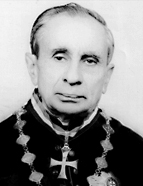

Yet, the call of letters and intellectual pursuits was strong, as seen in the articles he contributed to Diário do Minho [Minho Daily] and the diocesan bulletin Acção Católica [Catholic Action]. In 1944, he enrolled in the degree course in Historical and Philosophical Sciences at the Faculty of Letters of the University of Coimbra. He completed this phase of his academic journey in 1951, presenting his dissertation Calendários Portugueses Medievais [Medieval Portuguese Calendars], for which he received a grade of 18 points. Despite its scholarly value and frequent use, this work remains unpublished to this day. Simultaneously, between 1944 and 1952, he demonstrated his exceptional research skills. As a fellow of the Instituto de Alta Cultura [Institute of High Culture], he undertook pioneering and exhaustive work in various libraries and archives, searching for ancient liturgical codices. These parchments, which had fallen into disuse in the 16th and 17th centuries, were often repurposed as document or book covers. His efforts culminated in an extensive nine-volume inventory, which he typed himself. During this period, he became acquainted with one of the key figures who would deeply influence his development as a researcher and historian: the French scholar Pierre David. David had arrived in Portugal on a university mission in 1941 at the request of the French Institute in Portugal, and he quickly became involved with the Faculty’s recently founded Institute of Historical Studies under Dr António de Vasconcelos.
In 1952, on 16 February, Avelino de Jesus da Costa — commonly referred to as Father Avelino de Jesus da Costa — began a new chapter in his life. He was hired as a second assistant at the Faculdade de Letras da Universidade de Coimbra [Faculty of Arts and Humanities of the University of Coimbra], a position he held until February 1958. He received his doctorate from the same faculty on 16 December 1960, with a thesis titled O Bispo D. Pedro e a organização da Diocese de Braga [Bishop Pedro and the Organisation of the Diocese of Braga], which obtained a grade of 19 points, and for which he was awarded the Alexandre Herculano Prize for History in 1962. When invited on 28 January 1961, he accepted the position of First Assistant, and in 1971, after a competitive process for Extraordinary Professor in 1965, he was promoted to Full Professor. In January 1965, in a joint ceremony with Dr Salvador Dias Arnaut, he received his doctoral insignia. He graduated in the 1977-1978 academic year. He remained in Coimbra for about two years, attending the Faculty regularly, after which he retired to Braga, to the Seminário de Nossa Senhora da Conceição [Seminary of Our Lady of the Immaculate Conception], before moving to the Casa Sacerdotal da Diocese de Braga [Priests’ House of the Diocese of Braga], where he passed away. It was to that same diocese, to the Seminário Conciliar de S. Pedro e S. Paulo [Conciliar Seminary of Saints Peter and Paul], that he donated his precious library. The Archdiocese of Braga made this collection available at its own facilities to mark the centenary of AJC's birth on 4 January 2008.
